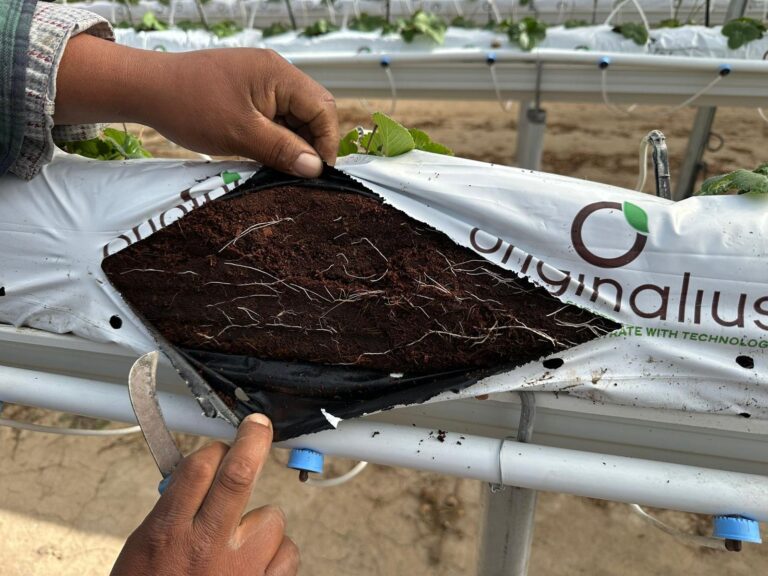Business management in the agricultural sector is not just a local challenge, but a global one. Farmers and entrepreneurs in this sector face increasing challenges: from the effects of climate change to water scarcity and the need to constantly innovate to compete globally. In this article, we will explore how the integration of new technologies, adequate financing and long-term planning can help overcome these obstacles and consolidate a more efficient and sustainable agriculture.
What does it mean to manage an agricultural business today?
Business management in the agricultural sector involves much more than planting and harvesting. It is about implementing advanced technologies, ensuring resource sustainability and adapting to global consumption trends. Current challenges such as climate change, water scarcity and market globalization make strategic planning more important than ever.
At the Fruit Attraction 2024 panel discussion, experts stressed that the key to successful management in agriculture lies in financing and modernizing farms. However, many companies in the sector face difficulties in accessing financing, which limits their ability to innovate.
“The future of the agricultural sector depends on the adoption of new technologies, but without access to financing, this transition is impossible.”
Financing, the engine of agricultural modernization
Access to financing is crucial for agricultural companies to adopt new technologies. During the roundtable, José Elías, an investor in several agricultural companies, stressed the importance of having funds to modernize infrastructure and improve efficiency. Without adequate investment, agribusinesses are forced to continue operating with obsolete infrastructure, which reduces their competitiveness.
In addition, as Francisco López of Industrias David commented, it is essential that subsidies focus on technology, not on “iron”. In other words, the objective should be to finance technological innovation that allows companies to improve their processes and increase efficiency, rather than subsidizing traditional machinery.
Innovation and technology: pillars of agricultural competitiveness
Innovation is at the heart of any successful business strategy in the agricultural sector. From precision agriculture to robotization and biotechnology, new technologies are transforming the way farms are managed.
Luis Miguel Peregrín, president of Agritech Murcia, highlighted at the round table the importance of efficient irrigation and data collection to optimize production with the least possible use of resources. This ability to collect and analyze data allows farmers to better understand the needs of their crops and maximize productivity.
Another relevant example is that of Javier Huete, from J.Huete, who stressed the importance of greenhouse automation and hydroponics as key tools to increase production and ensure long-term sustainability.
“Innovating is not an option, it is a necessity if we want our agriculture to be globally competitive.”
The challenge of employment in agriculture
One of the most important challenges facing the agricultural sector is the shortage of skilled labor. Francisco Lopez of David Industries commented that modernization of the sector could generate quality employment, but attracting young talent remains a challenge.
Automation poses a double problem: while it can increase efficiency, it can also reduce the demand for certain types of jobs.
Sustainability and efficiency: keys to the future
Sustainability is a recurring theme in the agricultural sector. Water scarcity, especially in regions such as Murcia, is a major concern. AZUD’s Alejandro Escolar highlighted at the round table that efficient irrigation solutions and biotechnology are key to ensuring that every drop of water is used to its full potential.
In addition, the use of biological fertilizers and biostimulants was pointed out by Javier Lucas of Lucas Biotech as one of the strategies to increase productivity in a sustainable way. These products not only improve crop yields, but also contribute to improving soil quality in the long term.
“Resource efficiency is essential to ensure long-term sustainability in agriculture.”
Internationalization: the key to growth
To remain competitive, agricultural entrepreneurs must look outward and bet on internationalization. Francisco Martínez, from Econex
Companies such as Novagric are already leading international projects, demonstrating that business collaboration and the development of turnkey projects are effective strategies for strengthening Spain’s position as an agricultural power.
Conclusions: Collaboration, technology and long-term vision.
Business management in the agricultural sector must focus on three fundamental pillars: collaboration between companies, the adoption of new technologies and long-term planning. Only through a clear strategy that combines these elements will it be possible to overcome current and future challenges.
If you are looking to improve the management of your agricultural business, the key is innovation and taking advantage of funding opportunities to modernize your processes.








